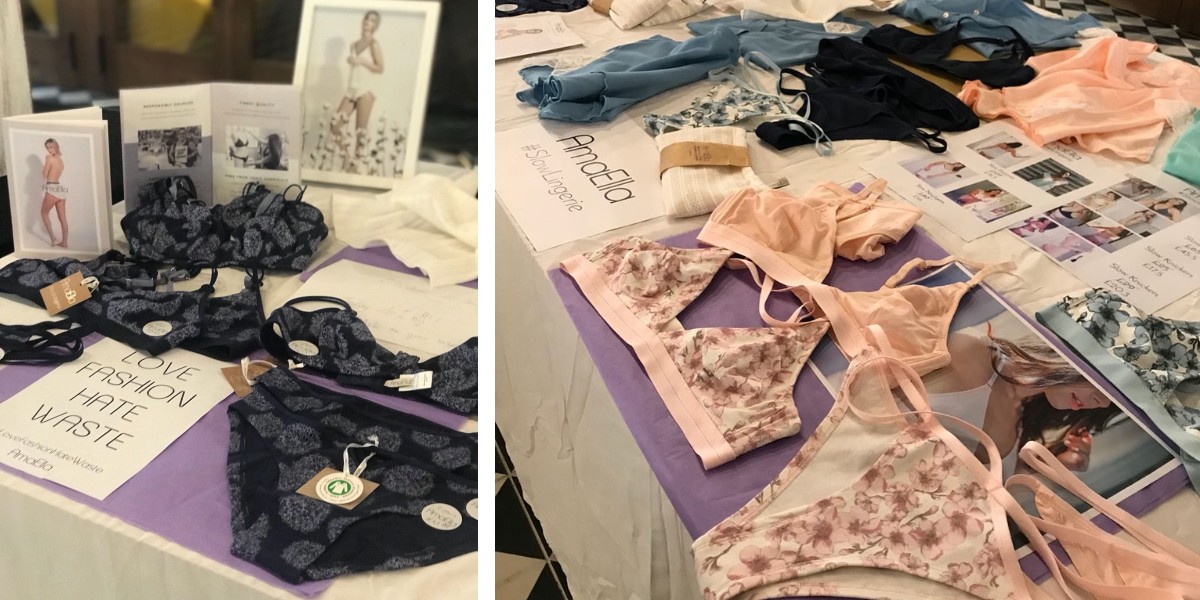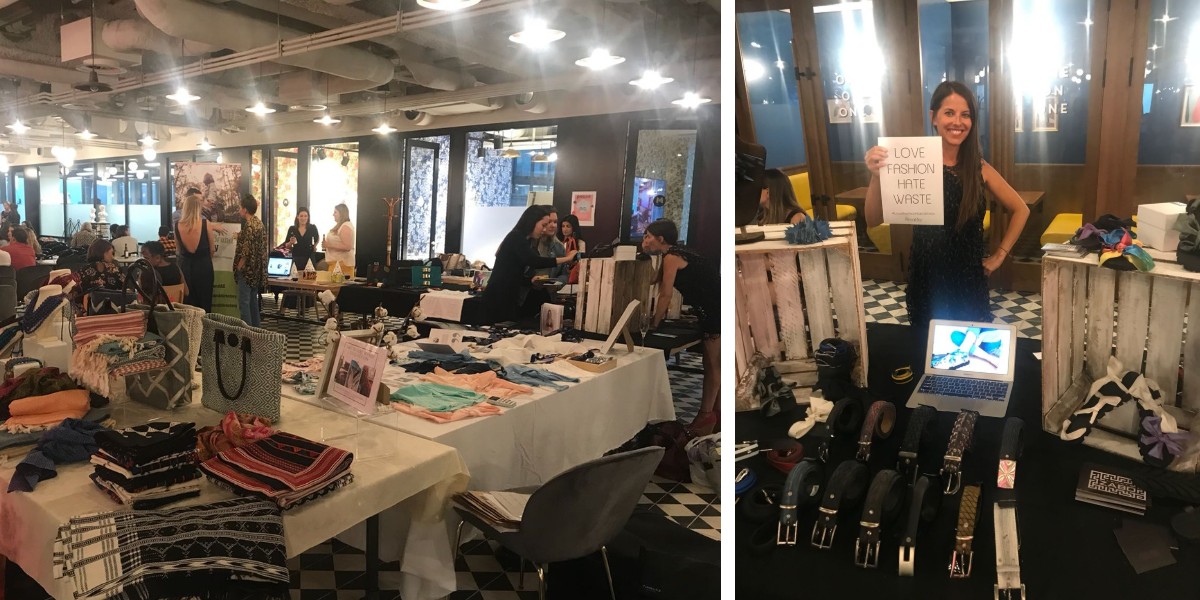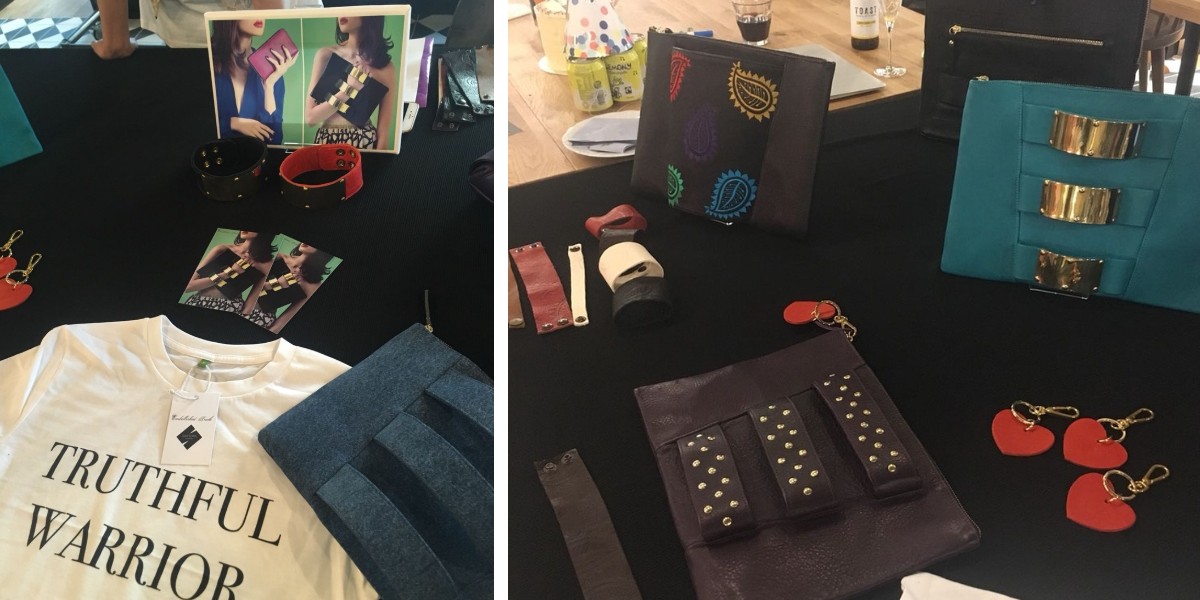EBD’s 1st Birthday event was a massive milestone. As we look back to the event, we recap on the event itself and what sustainable fashion really means. Our blogger Elly who attended the event has kindly shared her experience (and we’ve also included photos and feedback from other attendees).
On July 20th, Ethical Brand Directory officially celebrated its first-year milestone. To commemorate this achievement, founder Roberta Lee joined forces with Carl Pratt over at Future Planet to put on an extra special Sustainable Fashion event. Upon entering the venue, guests were greeted by an awesome showcase of ethical and sustainable fashion (by Ethical Brands that are members of the directory) giving attendees an opportunity to see the variety and quality of the clothes and accessories, talk to the founders and find out how they were made.

Roberta organised a great showcase featuring some of her favourite brands from the Ethical Brand Directory
Ethical Brand Directory and Future Planet joining forces for this event, made total sense. Future Planet aims to unite, empower and inspire like-minded people, to connect people who care about a more sustainable future and enable them to grow their communities and spheres of influence. And Ethical Brand Directory has been running events for the past year to empower consumers to think about what they buy and who they buy from. This collaboration made for the perfect event, both organisations and founders supporting one another’s vision and combining their efforts for a greater impact. The panel for the event were selected to give their views on fashion industry’s contribution to positive change for the people and the planet. Joining Roberta on the panel were Safia Minney, founder of People Tree and Managing Director at Po-Zu Shoes, Utami Giles, Marketing Director for Ananas Anam, David Greenfield, the organiser of the Circular Economy Club, and Andrea Crump, from the London Waste and Recycling Board. I have met many wonderful people in the sustainability community online, but being able to chat face-to-face, in a room full of people who share my passions and world view, felt incredibly empowering. Hearing from the influential people on the panel who all want the world to be a fairer, kinder place filled me with hope for the future of the fashion industry.
The Panel Discussion
Safia Minney Safia Minney started People Tree in Japan, with a focus on creating clothing that showcased the talents of local craftspeople. People Tree provides fairly paid employment for disadvantaged women, and uses fabrics that have less of an impact on local environments, like organic cotton. Safia believes that ethics need to meet aesthetics; customers should want to buy a garment because they love it and will wear it a lot, not just because it is an ethically made product. Producing a commercially viable product will attract new customers who weren’t previously interested in ethical fashion. Utami Giles Utami Giles is the Marketing Director at Ananas Anam. She is passionate about her work, saying, “every morning when I wake up I am happy to work for the company I work for.” Ananas Anam is the company behind Pinatex, a vegetable leather made from pineapple leaves. Selling the leaves as well as the fruits gives pineapple farmers a second income, and any plant matter left over from the Pinatex-making process can be returned to the farmers to be used for fertiliser. Pinatex utilises by-products of a well-established industry, so it doesn’t require any extra resources in terms of land or water for growing the raw materials. David Greenfield David Greenfield had some thought-provoking insights into industries that are trying to become more sustainable: ‘true’ sustainability jars with the traditional business model of constant selling, so it is important to get a coherent and positive message across. Sustainability should be about making better long-term choices and slowing down the current unsustainable cycle of consumption. Andrea Crump Andrea Crump is working to develop opportunities for more sustainable business practices. She is currently piloting a circular business model with ASOS and other big brands. Getting the brands responsible for ‘fast fashion’ on board with sustainability initiatives is vital if we are going to reduce the fashion industry’s impact on the planet. Andrea thinks it is possible to encourage customer loyalty not by constantly offering something new, but by offering services like repairs or recycling. Roberta Lee Roberta Lee is a stylist, speaker and founder of Roberta Style Lee, a company dedicated to empowering women and the founder of the Ethical Brand Directory. She talked about her experience as a stylist, and how her focus shifted towards ethical and sustainable fashion as she learnt more about the industry – being in a position of influence she felt she had a responsibility to show alternative options to fast-fashion, hence the birth of the directory in July 2017. She believes that when people wear clothing that is in line with their values – this can be really empowering, and that exploring your personal style and your personal values at the same time can be far more rewarding than the never-ending search for that elusive ‘perfect’ garment. I couldn’t agree more; changing my shopping habits so that I only buy clothes that fit with my principles has helped me to perfect my personal style, and be more adventurous with the clothes I wear. I’m excited to tell people the story behind an eye-catching piece of ethical clothing, and demonstrate how varied and creative the world of sustainable fashion can be. Carl from Future Planet put some important questions to the panel, who also took questions from the audience. Q: How do we change the behaviour of big brands? The answer started with a sobering statement from Safia Minney: we are all complicit in modern slavery. David Greenfield backed this up, and also linked our consumption of cheap fashion with low income in this country, which meant that many shoppers have few affordable ethical options. The cycle of low wages and exploitation perpetuates itself. Utami Giles pointed out that manufacturers like Ananas Anam need to work with brands committed to sustainability to maintain their credibility; small companies can become tainted by accusations of greenwashing more easily than multinational brands with huge advertising and PR budgets. Allowing sustainable fashion to become yet another disposable product is going to add to the problem, not solve it. Andrea Crump spoke about the importance of widespread behavioural change; we need to move away from this culture of overproduction and disposability. Roberta agreed: it’s only waste if we waste it. Q: Do we need legislation to make the fashion industry more sustainable? Roberta believes that better education is needed in schools to help young people understand how things are made; they can then use this knowledge to make more informed and thoughtful purchases. Andrea also believes that there is a skills gap when it comes to designing clothes that are made in a circular model, and teaching fashion students to work to a circular rather than linear model would go a long way to making the future of fashion more sustainable. Andrea mentioned the government’s call for evidence on sustainable fashion as part of their research into the industry; anyone can submit their experiences or evidence from their business. There is currently a bill being proposed on extended producer responsibility, which would see big brands having to make their products easier to reuse or recycle, rather than placing the burden of recycling on the consumer. Q: How do we make ethical fashion accessible to everyone? David’s simple answer took into consideration his earlier point about the cycles of low wages and exploitation: capitalism as it currently operates is totally dysfunctional! We are overproducing and discarding clothing at a rate the planet cannot sustain, and it’s not sustainable for the people working in the garment industry either. Roberta also spoke about changing our mindset towards fashion: ethical purchases do not have to be new things, buying vintage and secondhand slows the rate of unwanted garments ending up in landfill. We can support ethical brands by encouraging other people (who have the disposable income to afford higher prices) to buy from them, rather than buying new things we might not need ourselves. We also need to change the words we use: do we need to ‘buy’ new clothes and consume’ them? Could we borrow, rent or swap them instead?
As well as enjoying drinks and birthday cake, there was also an opportunity after the panel discussion for some ethical shopping. Roberta was greeted by a big cake (kindly provided by one of EBD’s sponsors Online Mastery) the guests of the event clinking champagne glasses and blasting out ‘happy birthday’ to Ethical Brand Directory.

Roberta looking chuffed with the EBD birthday cake

There was very much an emphasis on innovative sustainable design, with beautiful made-to-order organic cotton lingerie from AmaElla.

Bold statement accessories made from recycled rubber from Laura Zabo and luxurious handcrafted scarves and necklaces from Jewelled Buddha.
“It’s fantastic to meet so many like minded people and change makers. We all stand up for a better world whilst also looking good. Sustainable fashion is the future! EBD, EBD!!!!”
– Laura Halasz, Founder & Designer of Laura Zabo

Eco-friendly leather bags from Embellished Truth that wouldn’t look out of place at the most glamorous of occasions.
For every sale of the limited edition unisex tee 5% will be donated in aid of the charitable work of Fashion Revolution. https://bit.ly/2LftD0K “We were thrilled to showcase at Future Planet with the Ethical Brand Directory. The amazing panel lineup exceeded our expectations and brought a wealth of information for discussion and exploration. Thank you to everyone who came to find out about Embellished Truth and all the positive feedback about our designs. It was an honour to represent the EBD alongside brands we admire and lovely to connect with so many like minded people, with an interest in ethical and sustainable fashion practices. The event was a great launchpad for our new creative collaboration with sustainable womenswear brand, Sartors London. The ‘Truthful Warrior’ t-shirt is made from 100% certified organic cotton and made in a renewable energy powered factory, using low waste printing technology.”
– Bharati Manchanda – Founder & Designer of Embellished Truth
The sample of brands from the Ethical Brand Directory did a great job of showing that ethical fashion is not one specific style, there are brands out there that will suit your personal style and personal values, and you don’t need to spend hours trawling the Internet to find them. It’s resources like Ethical Brand Directory that make finding sustainable fashion easy. Elly

Elly Platt is an ethical fashion blogger on a mission to encourage everyone to love the clothes they own, and make thoughtful purchases that are good for people and the planet. As well as up-cycling and refashioning her existing wardrobe, Elly is always on the lookout for vintage treasures and sustainable fashion innovation. You can follow her on twitter @takeitupwearit
